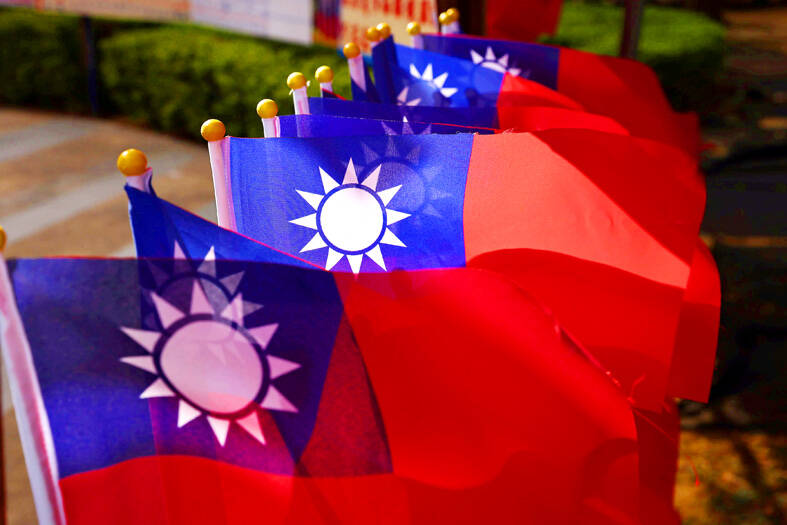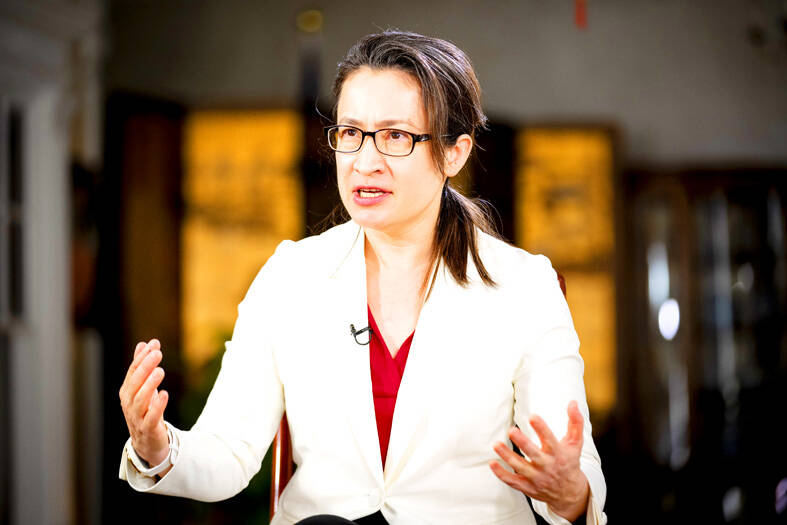Beijing has no right to decide or define how Taiwan engages with the world, Representative to the US Hsiao Bi-khim (蕭美琴) said in an interview with The Associated Press on Friday.
The interview came after a year of higher tensions with China, including China launching ballistic missiles over Taiwan and temporarily suspending most dialogue with the US after then-US House of Representatives speaker Nancy Pelosi visited Taiwan in August.
Asked if new US House Speaker Kevin McCarthy should make good on his earlier pledge to visit Taiwan as well, Hsiao said. “That will be his decision. But I think ultimately the people of Taiwan have welcomed visitors from around the world.”

Photo: Ann Wang, Reuters
Beijing’s leadership “has no right to decide or define how we engage with the world,” she added.
Hsiao spoke at Twin Oaks, the more than 130-year-old hilltop mansion that Taiwan uses for official functions in Washington. She talked on a range of Taiwan-US military, diplomatic and trade relations issues shaped by intensifying rivalries with China.
No Taiwanese flag flew over the building, reflecting Taiwan’s in-between status as a US ally that nonetheless lacks full US diplomatic recognition. The US withdrew that in 1979, on the same day it recognized Beijing as the sole government of China.

Photo: AP
In Washington, Taiwan’s self-rule is one issue that has strong support from both parties.
US administrations for decades have maintained a policy of leaving unsaid whether the US military would come to Taiwan’s defense if China did invade.
China’s military shows of force after Pelosi’s visit had some in the US Congress suggesting it was time for the US to abandon that policy, known as “strategic ambiguity,” and to instead make clear Americans would fight alongside Taiwan.
Asked about those calls on Friday, Hsiao only praised the existing policy.
“It has preserved the status quo for decades, or I should say it has preserved peace,” she said.
US President Joe Biden has repeatedly volunteered in public comments that the US would come to Taiwan’s defense, only to have aides walk that back with assurances that strategic ambiguity still prevails.
Meanwhile, after watching the Ukrainians’ successful hard-scrabble defense against invading Russian forces, Taiwan realizes it needs to load up on Javelins, Stingers, High Mobility Artillery Rocket Systems and other small, mobile weapons systems, Hsiao said.
The Taiwanese and Americans have reached agreement on some of those, she said.
Taiwan is pushing to make sure that a shift to grittier, lower-tech weapon supplies for Taiwanese ground forces “happens as soon as possible,” Hsiao said.
Even with the US and other allies pouring billions of dollars of such weapons into Ukraine for the active fight there, straining global arms stocks, “we are assured by our friends in the United States that Taiwan is a very important priority,” she said.
Taiwan has learned important lessons from Ukraine’s war that would help it deter any attack by China or defend itself if invaded, she said.
Among the lessons: Do more to prepare military reservists and also civilians for the kind of all-of-society fight that Ukrainians are waging against Russia.
“Everything we’re doing now is to prevent the pain and suffering of the tragedy of Ukraine from being repeated in our scenario in Taiwan,” she said. “So ultimately, we seek to deter the use of military force. But in a worst-case scenario, we understand that we have to be better prepared.”
Ukraine’s experience has had lessons for the US and other allies as well, she said, including the importance of a united allied stand behind threatened democracies.
“It’s critical to send a consistent message to the authoritarian leaders that force is never an option ... force will be met by a strong international response, including consequences,” Hsiao said.
Hsiao would not directly address a report by Nikkei Asia on Friday that US National Guard members had begun work training in Taiwan, saying only that Taiwan was exploring ways to work with the guard members to improve training.

MAKING WAVES: China’s maritime militia could become a nontraditional threat in war, clogging up shipping lanes to prevent US or Japanese intervention, a report said About 1,900 Chinese ships flying flags of convenience and fishing vessels that participated in China’s military exercises around Taiwan last month and in January last year have been listed for monitoring, Coast Guard Administration (CGA) Deputy Director-General Hsieh Ching-chin (謝慶欽) said yesterday. Following amendments to the Commercial Port Act (商港法) and the Law of Ships (船舶法) last month, the CGA can designate possible berthing areas or deny ports of call for vessels suspected of loitering around areas where undersea cables can be accessed, Oceans Affairs Council Minister Kuan Bi-ling (管碧玲) said. The list of suspected ships, originally 300, had risen to about

DAREDEVIL: Honnold said it had always been a dream of his to climb Taipei 101, while a Netflix producer said the skyscraper was ‘a real icon of this country’ US climber Alex Honnold yesterday took on Taiwan’s tallest building, becoming the first person to scale Taipei 101 without a rope, harness or safety net. Hundreds of spectators gathered at the base of the 101-story skyscraper to watch Honnold, 40, embark on his daredevil feat, which was also broadcast live on Netflix. Dressed in a red T-shirt and yellow custom-made climbing shoes, Honnold swiftly moved up the southeast face of the glass and steel building. At one point, he stepped onto a platform midway up to wave down at fans and onlookers who were taking photos. People watching from inside

Japan’s strategic alliance with the US would collapse if Tokyo were to turn away from a conflict in Taiwan, Japanese Prime Minister Sanae Takaichi said yesterday, but distanced herself from previous comments that suggested a possible military response in such an event. Takaichi expressed her latest views on a nationally broadcast TV program late on Monday, where an opposition party leader criticized her for igniting tensions with China with the earlier remarks. Ties between Japan and China have sunk to the worst level in years after Takaichi said in November that a hypothetical Chinese attack on Taiwan could bring about a Japanese

STREAMLINED: The dedicated funding would allow the US to transfer equipment to Taiwan when needed and order upgraded replacements for stockpiles, a source said The US House of Representatives on Thursday passed a defense appropriations bill totaling US$838.7 billion, of which US$1 billion is to be allocated to reinforcing security cooperation with Taiwan and US$150 million to replace defense articles provided to the nation. These are part of the Consolidated Appropriation Act, which the US House yesterday passed with 341 votes in favor and 88 against. The act must be passed by the US Senate before Friday next week to avoid another government shutdown. The US House Committee on Appropriations on Monday unveiled the act, saying that it allocates US$1 billion for the Taiwan Security Cooperation Initiative